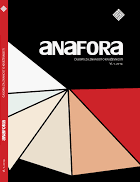
Anafora
metrics 2024
Unveiling diverse perspectives in communication and literature.
Introduction
Anafora is an essential open-access journal published by the University of Osijek, Faculty of Humanities & Social Sciences, contributing to the dynamic fields of Communication, Cultural Studies, and Literature and Literary Theory. Since its inception in 2014, the journal has committed itself to disseminating innovative research and critical analysis, attracting a diverse array of scholars and practitioners from across the globe. Based in Croatia, Anafora's content is accessible to all, fostering inclusivity and collaboration within academia. While the journal currently holds a Q4 ranking in both Communication and Cultural Studies, and a Q3 in Literature and Literary Theory as of 2023, its growth trajectory indicates a promising future for the contributions it gathers. Researchers, students, and professionals alike are encouraged to engage with this platform to explore the multifaceted aspects of human expression and cultural discourse, thereby enriching the scholarly conversation within these pivotal domains.
Metrics 2024
 0.11
0.11 -
- 0.10
0.10 2
2Metrics History
Rank 2024
Scopus
JCI (Web Of Science)
Quartile History
Similar Journals
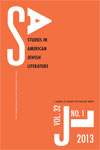
Studies in American Jewish Literature
Celebrating the Legacy of Jewish Literary ContributionsStudies in American Jewish Literature, published by Penn State University Press, is a premier academic journal that delves into the rich tapestry of Jewish literary expression in America. With an ISSN of 0271-9274 and an E-ISSN of 1948-5077, this journal serves a vital role in the fields of Literature and Literary Theory, Cultural Studies, and Anthropology, as evidenced by its placement in the Q1 to Q3 quartiles across various categories in 2023. The journal is a key platform for researchers, professionals, and students interested in exploring the intersection of Jewish identity and American literature, contributing to a deeper understanding of cultural narratives and societal impacts. The publisher's commitment to scholarly excellence ensures that each issue is meticulously curated, showcasing innovative research and critical analysis. While not open access, the journal provides essential insights for anyone engaged in the study of Jewish literature or the broader cultural dynamics at play in American society. Stay informed on contemporary themes and historical contexts that shape literary discourse through this commendable publication.
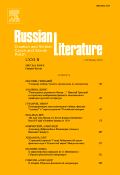
RUSSIAN LITERATURE
Unveiling the Complexity of Russian Literary TheoryRUSSIAN LITERATURE is a premier academic journal published by ELSEVIER, dedicated to advancing the study of Russian literary traditions, critical theory, and cultural contexts. With an ISSN of 0304-3479 and an E-ISSN of 1878-3678, this journal has firmly established itself as a vital resource in the field, achieving a commendable Q1 ranking in Literature and Literary Theory as of 2023. The journal benefits from a strong impact factor and ranks #178 out of 1106 in the Scopus database, placing it in the 83rd percentile of arts and humanities research. RUSSIAN LITERATURE covers an extensive timeline, converging years from 1971 to 1974 and from 1976 to 2023, reflecting its rich academic lineage. Although not an open-access publication, the journal remains influential among scholars, professionals, and students seeking in-depth analyses and critical insights into Russian literature and literary theory. Its commitment to scholarly rigor makes it an essential read for anyone engaging with the complexities of literary studies.
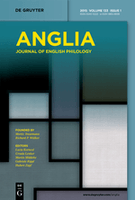
ANGLIA-ZEITSCHRIFT FUR ENGLISCHE PHILOLOGIE
Fostering Scholarly Engagement in Literary TheoryANGLIA-ZEITSCHRIFT FUR ENGLISCHE PHILOLOGIE, published by WALTER DE GRUYTER GMBH, stands as a significant periodical in the fields of Linguistics and Literary Theory. With a rich publication history dating back to 1878 and ongoing contributions until 2024, this esteemed journal serves as a vital resource for researchers, professionals, and students interested in the evolution of the English language and literature. Although it does not currently offer open access, its rigorous peer-reviewed articles have secured a respectable standing, ranking Q3 in Linguistics and Language and Q2 in Literature and Literary Theory as of 2023. The journal, located in Berlin, Germany, continues to drive academic discourse and foster scholarly engagement in the intricacies of English philology, making it an essential platform for the latest research and developments in the field.
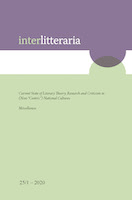
Interlitteraria
Illuminating Contemporary Trends and Historical NarrativesInterlitteraria is a distinguished academic journal dedicated to the exploration and analysis of literary studies across various cultural contexts. Published by TARTU UIKOOLI KIRJASTUS OU, this Open Access journal has been making its insightful contributions to the field since 2012, ensuring widespread accessibility to its research. With an ISSN of 1406-0701 and an E-ISSN of 2228-4729, Interlitteraria aims to facilitate the exchange of knowledge among scholars, researchers, and students interested in comparative literature, literary theory, and interdisciplinary approaches to the humanities. While the journal’s HIndex and Scopus ranks are currently not specified, its dedication to academic excellence and its commitment to fostering scholarly dialogue make it an invaluable resource for those investigating contemporary literary trends and historical narratives. Based in Tartu, Estonia, this journal provides a platform for diverse literary voices and critical thought, firmly establishing itself as an essential tool for advancing the study of literature in an interconnected world.
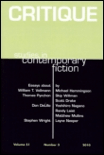
CRITIQUE-STUDIES IN CONTEMPORARY FICTION
Celebrating the Rich Tapestry of Modern Literary DiscourseCRITIQUE: STUDIES IN CONTEMPORARY FICTION is a premier scholarly journal published by Routledge Journals, Taylor & Francis Ltd, dedicated to advancing our understanding of contemporary fiction within the broader spectrum of literature and literary theory. With an esteemed reputation in the academic community, this journal has achieved a remarkable impact factor and ranks in the Q1 category in Literature and Literary Theory, showcasing its influence and credibility, as reflected in its Scopus Rank of #142 out of 1,106 and a notable 87th percentile. The journal invites researchers, scholars, and students to engage with innovative perspectives, critical analysis, and interdisciplinary exploration of contemporary narratives. Published continuously since 1956, CRITIQUE serves as a vital resource for those seeking to understand the complexities of modern literature, and it remains committed to fostering dialogue around diverse textual and cultural contexts.
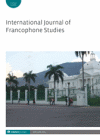
INTERNATIONAL JOURNAL OF FRANCOPHONE STUDIES
Navigating the Intersections of Culture and SocietyThe INTERNATIONAL JOURNAL OF FRANCOPHONE STUDIES, published by INTELLECT LTD, serves as a significant platform for exploring the multifaceted dimensions of Francophone culture and its impact across various disciplines. With an ISSN of 1368-2679 and E-ISSN 1758-9142, this journal supports a diverse scholarly discourse in areas such as Cultural Studies, Gender Studies, History, Linguistics, Literature, and Sociology, among others. As of 2023, it is categorized in Q4 for multiple fields and Q3 for Literature and Literary Theory, underscoring its evolving academic presence. Researchers, professionals, and students can benefit from its rich repository of critical analyses and innovative perspectives that foster an understanding of the Francophone world from a global viewpoint. Although it does not offer open access options, its rigorous peer-review process ensures high-quality contributions that are essential for anyone engaged in Francophone studies. Situated in the United Kingdom, the journal has forged an academic legacy since its inception and continues to be a vital resource for those studying the intersections of language, culture, and identity.

CANADIAN LITERATURE
Fostering Interdisciplinary Dialogues in Canadian LiteratureCanadian Literature is a distinguished journal published by the University of British Columbia, dedicated to exploring the rich landscape of Canadian literary studies. With its strong impact in the field, evidenced by its Scopus ranking of #197 out of 845 in the category of Arts and Humanities, specifically in Literature and Literary Theory, this journal serves as a pivotal platform for both emerging and established scholars. Covering a wide range of topics related to Canadian literature and culture, it aims to foster an interdisciplinary dialogue that reflects the diverse voices and narratives shaping the literary scene in Canada. Though the journal transitioned its coverage in Scopus after 2019, it continues to provide valuable insights and critical discourse in its publications. Researchers, students, and professionals looking to deepen their understanding of Canadian literature will find Canadian Literature an essential resource for contemporary scholarship.
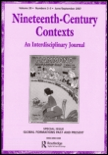
Nineteenth-Century Contexts-An Interdisciplinary Journal
Decoding the Past: Where Literature Meets CultureNineteenth-Century Contexts: An Interdisciplinary Journal is a pivotal academic publication that serves as a vital resource for scholars and students engaged in the exploration of the complex cultural, literary, and social dimensions of the nineteenth century. Published by Routledge Journals, Taylor & Francis Ltd, this journal holds a position within the Q2 and Q3 quartiles in the fields of Literature and Literary Theory and Cultural Studies respectively, illustrating its significance and relevance in contemporary research. Since its inception in 1987, it has fostered interdisciplinary dialogue and examination of the era's rich contexts, featuring articles that weave together historical, literary, and cultural analyses. Although the journal does not currently offer an open access model, its rigorous peer-review process guarantees scholarly integrity and quality. Housed in the United Kingdom, it caters to a global audience, thereby attracting diverse perspectives and insights, making it an essential publication for anyone looking to deepen their understanding of the complexities of the nineteenth century.

Letteratura e Letterature
Advancing Interdisciplinary Insights in Literature and Linguistics.Letteratura e Letterature is a distinguished scholarly journal dedicated to exploring the nuances of literature and linguistic theory, published by FABRIZIO SERRA EDITORE. This journal, identifiable by its ISSN 1971-906X and E-ISSN 1973-2600, serves as a significant platform for researchers, professionals, and students engaged in critical discourse within the fields of Literature and Linguistics. With a focus on fostering interdisciplinary dialogues, it seeks to illuminate diverse literary phenomena and linguistic intricacies, contributing meaningfully to the academic community. Despite being categorized in the Q4 and Q3 quartiles in 2023, the journal remains a vital resource, encouraging innovative scholarship and broadening the understanding of literary and linguistic interactions. Although it does not currently offer open access, the journal promises rigorous peer-reviewed content, ensuring the quality of published research. Operating from its base in Pisa, Italy, the journal continues to embrace its converged years from 2014 to 2021 and the ongoing 2023 to 2024 period as an era for refined scholarship and vibrant academic exchange.

Novoe Literaturnoe Obozrenie
Illuminating Contemporary Literary LandscapesNovoe Literaturnoe Obozrenie, an esteemed publication dedicated to the realms of Cultural Studies and Literature and Literary Theory, serves as a vital resource for scholars and professionals alike. Published by NOVOE LITERATURNOE OBOZRENIE-NEW LITERARY OBSERVER in the Russian Federation, this journal provides critical insights and scholarly critiques that reflect the evolving landscape of literary discourse. With an established H-index and a focus on fostering academic inquiry, the journal has secured its place amidst contemporary scholarly discussions, indexed in Scopus with rankings that illustrate its commitment to quality despite a current presence in the lower quartiles. Novoe Literaturnoe Obozrenie is a non-open-access journal, encouraging a traditional yet scholarly approach to literary studies and remains an essential read for researchers, students, and professionals that seek to deepen their understanding of literature’s impact on culture and society. Publishing from 2016 until 2024, it continues to bridge theoretical frameworks with practical discourse, making significant contributions to the fields it encompasses.